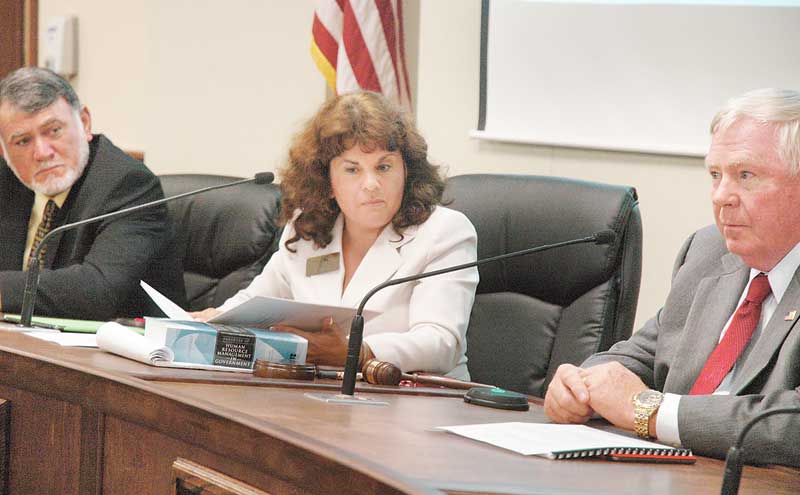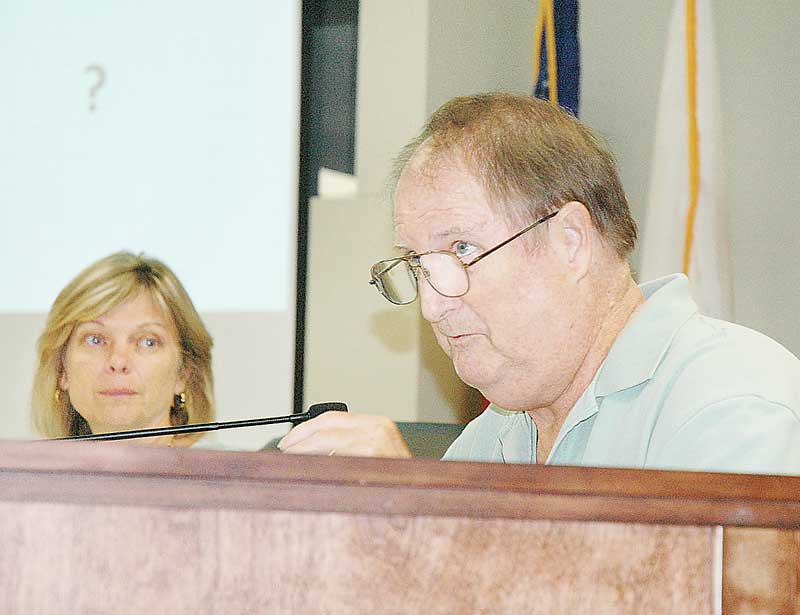The Peachtree City Council on Oct. 2 by a 3-2 vote adopted the provisions of the recent classification and compensation study at a cost of more than $900,000. Of that amount, more than $640,000 was not included in the budget adopted last month to pay for the next 12 months.
(Also see opinion column, “Government Party wins, taxpayers lose”; and a letter to the editor, “PTC pay plan and the 35% lie“)
As adopted, the plan calls for $640,354 in new financial commitments by the council beyond the $270,000 which was part of the recently adopted FY 2015 budget. In total, the plan carries a cost of $936,039. The cost includes both the compensation plan increases and the impact of benefits, said Human Resources Director Ellece Brown in the presentation to the council.
Brown said the plan includes both classification and equity adjustments. Equity adjustments are based on a maximum of 2 percent increases for employees with 1-3 years of service, 4 percent for employees with 4-6 years of service and a 6 percent increase for those with 7 or more years with the city. The new plan includes 25 pay grades.
Pertaining to compensation, council during the presentation was told that Peachtree City employees ranked in the 35th percentile in the recent study performed by Condrey and Associates when compared to 20 similar metro Atlanta municipalities and county governments, including those of Fayette and Coweta counties and Newnan.
The vote came with Mayor Vanessa Fleisch and councilmen Terry Ernst and Mike King in favor of the adoption and council members Kim Learnard and Eric Imker opposed.
At left, (L-R), King, Fleisch and Ernst. Photo/Ben Nelms.
Though only two city staff members spoke during public comments, a large contingent of firefighters and other city employees showed up for the vote — a dozen or more lining one wall of the meeting room. One of the speakers, Fire Training Officer Ron Mundy, said if the study was not adopted he was afraid that the city would lose a number of quality people.
“We’ve been told for six years to continue to do the job we’re doing,” Mundy said, adding that if the plan is not adopted, some of those who stay will become a cancer.
Also advocating the plan adoption was Battalion Chief Chris Campbell who asked that the plan be adopted to bring city staff to the 50th percentile of compensation compared to the jurisdictions noted in the study.
“The taxpaying citizens of this community expect and receive a high level of professionalism from our fire department. They receive that at bargain basement prices. Although we would like top shelf compensation, getting us on a middle shelf in the light of day is a start. We are professionals, please compensate us accordingly,” Campbell said, adding that he works three jobs in order to live in Peachtree City. ‘Plan to stay’ is the motto we ask of our citizens. Why don’t we ask this of our employees? Retention and recruitment of quality employees has gotten very difficult over the years due to the competitiveness of the metro area.”
The issue after those remarks went to the council.
Councilman King prior to the vote said, “Being in the 35th percentile is an embarrassment. It should be. We’ve got a chance to do something tonight that will force the can not to be kicked down the road. From a business standpoint, you get what we pay for.”
King in August was the swing vote in a 3-to-2 vote to approve a much smaller 2 percent “inverse” raise that would have given lower paid employees bigger boosts than highly paid staff members. He switched to the larger hike last week without explaining his earlier vote.
Next up with comments was Ernst, a former police officer. Ernst said he was fortunate to have been retired from the military, an advantage that allowed him to live in Peachtree City while serving in the police department. Ernst retired from the police department after a reorganization under former Chief H.C. “Skip” Clark deleted Ernst’s position two years ago last month.
“We have a chance to do something here tonight,” he said.
Imker in his comments said that while the current salary structure needs to be improved, he had hoped the vote could be delayed so that the flaws he found in the study could be addressed.
“I hoped we could have delayed the decision tonight because we don’t know the full impact of what this vote is going to be. I can tell right now it’s going to pass. So congratulations to all the employees,” said Imker.

At right, (L-R) Councilwoman Kim Learnard and Councilman Eric Imker. Photo/Ben Nelms.
With that, Imker said supervisory staff do a good job making the workplace desirable, adding that the current salary structure must be improved. Imker said he also agreed with the study which recommended the city decrease the number of pay grades from 31 to 25.
Imker questioned if anyone in the audience realized that no current employees would be placed in any of the first eight grades. Imker said his recent idea on salary increases was to get the lower paid employees a better rate of pay, adding that these are issues he believes need to be addressed.
“I had hoped we would take more time to understand the impact of the total picture of what we’re doing,” he said.
At that point Imker described a number of areas within the study he said were questionable.
He addressed the 20 cities and counties across metro Atlanta included in the study and Peachtree City’s ranking in the 35th percentile.
“Within a 15-mile radius of Peachtree City we are at about 90 percent at the top of the salary scale for public employees,” Imker said. “You grab hold of this 35th percentile figure and you won’t let it go, but you’re not looking at the whole picture. For the most part, our employees come from this 15-mile radius. If we place this 15-mile radius right in the middle of the metro Atlanta area where 90 percent of the data in the survey came from, yes we wind up at the 35th percentile. But we don’t live in Atlanta. We live on the south side. Yes it’s difficult to find employees, but filling a few positions and having a difficult time doing it (does not require spending) a million dollars to fix.”
Imker in other points said city data shows that Peachtree City falls below the average in employees leaving and that city employees have a favorable advantage in pension benefits. Imker maintained that one-third of the cities with higher salaries included in the study have employees who contribute to their pension plan while Peachtree City’s employees do not.
“Our taxpayers pay $1.5 million into your pension plans on top of your salaries. I don’t know if (the study) included that,” Imker said, again illustrating his call to obtain more information before the vote. “Going into all this without this knowledge is a problem for me.”
Turning to the retirement fund used to pay future pensions, Imker said permanently adding $640,000 each year remains an unknown variable in terms of the city’s future financial situation.
And pertaining to budget adjustments, Imker questioned where the money would come from.
“The initial reaction is that the ($640,000) will come from reserves. Really? Over the next five years we will have just busted our budget,” Imker said, again stating his rationale for having more information prior to a vote.
Based on those and other issues with the study’s conclusions, Imker said the council needed more information before voting, though he acknowledged that “this isn’t going to happen.”
Learnard in her comments praised city staff, acknowledging that they deserve better compensation while questioning the adoption of increases prior to having the necessary questions answered.
“There is no question in my mind that our staff are worth $1 million and this is a $1 million decision. We’ve known these past five years when we all hung in there there that our staff are worth $1 million, but we didn’t have it to give,” Learnard said. “Our job up here is to reconcile your value and all you do for our city with what taxpayers can pay. I don’t take a $1 million decision lightly no matter what it is.”
Learnard said when first presented to the council there was a wealth of information included.
“I’ve done enough research to know that there are some things missing. (Since initially presented) I know that there are other things we are missing in the study,” Learnard said, noting the necessity to provide pay increases for staff. “We have yet to thoughtfully decide the best way to do it. I am not ready to make this $1 million vote tonight. (City staff) are worth it, there is no question in my mind. But how to do it and how pay for it and how to move forward as a city has not been responsibly addressed.”
Fleisch, also prior to the vote, thanked the employees who took the time to participate in the study.
“You (Imker) knew about this for months. To say that this was a surprise, you could have been here for the workshop,” Fleisch said to Imker who was not present at the September workshop where the study presentation was made. “For five years, when I walked into this place, I was under the delusion about the way the city was run. The fist thing employees said to me was this is a horrible place to work. And I took that as (being disgruntled). Anyone who takes the time see what goes into running this city would see what has been going on for the past five years. To not have done a study for the past 14 years, thank you all for hanging in there with us. We did get the presentation at the workshop. I know how much work went into (the study). I’m embarrassed that we’re at 35 percent. This is finally setting something right that has (existed) for a number of years. One reason I wanted (the study) on the agenda sooner rather than later is because (city employees) deserve this after all the work they have put in. And it deserves an up or down vote tonight.”
With that, the motion to adopt the study resolution was made and passed on a 3-2 vote with Fleisch, King and Ernst voting in favor and Learnard and Imker opposed.
The new compensation and classification program will take effect Oct. 20.
City Manager Jim Pennington in a Sept. 24 letter recommended that the council repeal the 2000 Employee Job Classification and Compensation Plan and adopt the recently presented 2014 plan. Pennington recommended that the council on Oct. 2 adopt the unmodified Option B presented by Condrey and Associates.
“Since the general fund budget already includes $270,071 of funding towards the compensation plan, the FY 2015 budget impact of the new Employee Job Classification and Compensation Plan, Option B (unmodified), will be an estimated $640,354 based on an implementation date of Oct. 20. Additional funding needed for the compensation plan would be appropriated from cash reserves,” Pennington said.
Pennington said the Plan B option being recommended is based on the 50th percentile of the study and is slightly above the market average.
“When the last pay study was conducted in 2000, staff recommended the council consider approving the classification and compensation plan based on the 75th percentile,” Pennington said. “Given today’s economy, staff is conservatively recommending Plan B. While this plan does not solve all of the problems existing in the pay structure today, it does provide a new pay scale that is competitive in the relevant labor market and it further professionalizes and strengthens the administrative infrastructure of the city.”
Pennington said one of the issues impacted by the recent classification and compensation study has been the inability to fill some positions at the current minimum salary level. He said some new hires required having to go “way into the salary range” to accomplish.
Brown recommended reviewing the city’s position on compensation compared to the area market in five years and conducting a new study in 10 years.
The study noted that 44 percent of Peachtree City employees live in Coweta County while 39 percent live in Fayette County and 17 percent reside in other locations.












Leave a Comment
You must be logged in to post a comment.